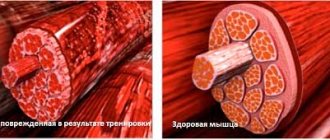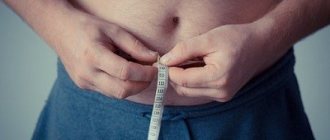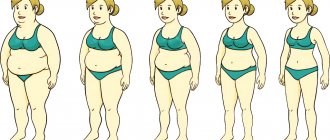Many people lead a healthy lifestyle, use special diets to lose weight, go to the gym, regularly take long walks and, nevertheless, cannot lose excess weight. It is especially difficult to get rid of fat deposits in the waist, abdomen and thighs.
Everyone is familiar with the popular recommendation for losing weight:
Eat fewer calories, burn more calories than you consume, and your weight will decrease.
However, some do not care at all about proper nutrition, eat a lot of cakes, sweets, bread, pasta, store-bought sauces and other unhealthy foods and still remain slim. Others count calories, restrict themselves in food, practice fasting, special diets, work out for hours in the gym and remain fat.
Typically, in these cases, the cause of fat on the abdomen, buttocks and thighs is a hormonal imbalance. Several hormones that activate the weight loss process are responsible for weight loss. In order to solve this problem, their balance should be established.
Weight loss hormones that affect weight
Hormones are special biologically active substances. They are of organic origin. They are produced in the endocrine glands. The task is to regulate the most complex organic processes. They have a direct effect on metabolism and physiological functions.
There are hormones on which not only the proper functioning of organs and systems, but also body weight depends. Their normal quantity is the key to a beautiful, slender body.
General characteristics for all substances from this list:
- Starting the fat burning process.
- Normalization of hormonal levels.
- Improved overall well-being.
- Losing weight.
How to properly and safely regulate hormonal levels? This is discussed in our article.
Leptin
It is produced by the fatty tissue of the body and is called the “hunger hormone”. The feeling of satiety largely depends on it, as it sends signals of satiety to the brain. If there is an excess of diet towards carbohydrate foods, the body begins to store carbohydrates in the form of fat deposits. Problem areas: thighs, legs, buttocks, abdomen.
The situation inevitably leads to an excess of the hormone in the body and subsequently to the formation of tolerance to it. This means that the brain does not receive satiety signals on time, and the person chronically overeats. He eats large portions of food regardless of whether he is hungry or already full.
Leptin levels can be adjusted. To do this you need:
- go to bed on time and ensure all measures necessary for a good night's rest;
- include foods high in omega-3 fatty acids (chia seeds, meat, fish) in your daily diet;
- take care of the correct daily routine;
- exercise regularly.
If these simple instructions are not followed, a person does not feel full. Pay attention to the following fact established by doctors: chronic lack of sleep alone leads to constant overeating!
How to negotiate with hormones that prevent you from losing weight
Often, all the efforts of women to lose weight end in nothing. Sometimes it seems that everything is being done correctly, but the hated kilograms do not go away. For some women, the first few kilograms are the hardest for them. For others, it is the last 3 kg that cannot be moved. And, despite all previous efforts, this is often enough to make you want to throw the scale out of the window and never measure your waist size with a measuring tape again. But what if the problem is that your weight loss efforts are being misdirected?
What hormones prevent you from losing weight?
Instead of worrying too much about the number of divisions by which the scale needle has deviated, it is better to turn your attention to the amount of hormones in your body, but first you need to find out how hormones affect a woman’s weight.
You won't believe how much hormones affect excess weight and ultimately the size of your waist. For many women, an excess or deficiency of certain hormones actually blocks any weight loss efforts. Now for the good news - you can make a few small changes to your lifestyle to help your hormones work for you rather than against you.
Now it's time to find out which hormones are responsible for weight loss, plus recommendations on what you can do to balance the hormones that regulate fat metabolism.
1) Hormone Adiponectin
Adiponectin is a hormone that regulates glucose levels, breaks down fatty acids, increases the muscle's ability to use carbohydrates as an energy source, enhances metabolism, and increases the rate at which the body breaks down fat. All these factors are extremely important for those who want to lose excess weight or maintain it at a normal level.
Numerous studies show that a lack of Adiponectin leads to excess weight gain and obesity . The bad news is that research has found that the more fat a person has, the less Adiponectin they have. On the other hand, a less obese person with a lower percentage of body fat releases more Adiponectin from fat cells.
It is important to increase low Adiponectin , since this hormone affects not only weight. Thus, recent studies have found that people with low levels of Adiponectin and those who are obese have an increased risk of developing type 2 diabetes, metabolic syndrome, atherosclerosis and cardiovascular diseases.
Here's what to do if you have low Adiponectin:
To help your body produce more Adiponectin, you must, first, be more careful about your diet.
- should appear on your daily menu : spinach, pumpkin seeds, almonds, avocados and figs.
- You should also increase the proportion of monounsaturated fats and reduce the proportion of carbohydrates.
- In addition, regular exercise , especially for overweight individuals.
2) Hunger hormone Ghrelin
Have you ever had an overwhelming urge to eat something soon after eating? Have you ever gotten up at night just to eat a sweet cupcake or some greasy chips? If your answer is yes, then most likely your Ghrelin levels were elevated at that time.
Ghrelin is often called the hunger hormone. Simply put, the higher your Ghrelin levels, the more hungry you feel . Studies have shown that people given Ghrelin ate significantly more than their usual food intake.
This specific hormone is mainly produced in the stomach. Its function is to send signals to the brain, letting the body know that it wants to eat. It also stimulates the brain's pleasure centers, allowing you to remember how delicious the first bite was. That's why it's hard to stop after eating your first cookie. Researchers call this process the stomach-brain connection.
If you are someone who thinks you can get rid of food cravings by fasting, think again. Cutting calories in an attempt to lose weight actually increases ghrelin levels. Researchers found elevated levels of this hormone in people even after they spent 12 months on a low-calorie diet. That is, in other words, your body will never get used to eating less and will continue to send signals to your brain about feeling hungry.
What should be done in such cases?
1. To keep you feeling full, you need to fill your body with healthy fats and proteins.
2. New research has shown that in addition to diet, sleep is also a priority factor for ghrelin levels. The more you sleep, the lower your Ghrelin levels. Chronic sleep deprivation increases ghrelin levels, causing you to feel gratuitously hungry between meals. General recommendations state that a person should sleep 7-9 hours a night. Despite the fact that it is difficult to allocate free time, since there is simply not enough time to solve all daily tasks, it is important to allocate enough time for proper rest. If you often can't fall asleep or have trouble sleeping, you need to develop the habit of performing a daily relaxing ritual before bed.
3) Hormone Leptin
Leptin is another hormone that greatly influences appetite and weight loss. It is released from your body's fat cells and then signals the brain (the hypothalamus, to be precise) to reduce your appetite and burn more calories. Leptin primarily signals to the brain that the body is full and has stored enough fat.
In contrast to Ghrelin, Leptin is often called the satiety hormone. The more fat a person has, the more Leptin the fat cells release. Obese people have very high levels of Leptin. It may seem that a lot of fat is good, but at the same time it also develops immunity to Leptin.
Leptin immunity is a condition when an important signal from the hormone about satiety does not reach the brain. With such immunity, the body thinks that it is starving, although it is not. It is important to note that the body's immunity to Leptin goes away with weight loss. When you lose weight, Leptin becomes more effective.
What should you do in such cases:
- To increase Leptin levels, you need to clean up your diet and make sure you have enough time for sleep.
- When it comes to food, you need to make sure you have enough healthy fats, proteins, and soluble fiber.
- also need to avoid highly processed foods and reduce the level of triglycerides in the blood (reduce sweets, reduce refined carbohydrates, eliminate alcohol, eat foods with Omega-3 fatty acids, as well as plant-based foods with fiber, reduce the amount of very sweet fruits, start exercising) .
- Additionally, when the researchers looked at the effect of lack of sleep on Ghrelin, they also found that lack of good sleep negatively affected Leptin.
- Finally, research shows that physical activity may help reverse leptin resistance.
4) Insulin imbalance
Insulin is an important hormone produced by the pancreas that affects the entire body. It allows glucose obtained from food to enter the body's cells for further breakdown and production of energy, which is necessary for normal cell function. Insulin also plays an important role in helping the body recover from intense exercise and maintaining normal blood sugar levels. If you are overweight, you most likely have unbalanced insulin levels. This negatively affects the breakdown of fat in deposits.
Let's take a step back and talk about how insulin becomes imbalanced. Insulin and carbohydrates are closely related. The more carbohydrates you eat, the more insulin is released in the body. An excess of insulin allows glucose (read sugar) to run rampant in the body. Instead of using excess sugar to fuel muscles after exercise or generate energy for cells, the body stores most of the carbohydrates from food in fat folds. People who have insulin resistance feel like they will never be able to lose excess fat.
However, there are a few recommendations that you should follow.
- First, you need to reduce your consumption of high-carbohydrate baked goods. It is better to get the carbohydrates you need from fresh fruits and vegetables. But you need to be careful with the amount of fruit you eat. After all, sugar is sugar.
- Additionally, recent studies have shown that drinking two tablespoons of apple cider vinegar before a high-carbohydrate meal helps lower blood glucose levels in people with insulin resistance. The effect is so noticeable that researchers say vinegar may be as effective as prescription medications for regulating blood sugar.
5) Estrogen dominance
The hormone Estrogen is extremely important for reproductive sexual development, especially in women. It is involved in the formation of breasts, pubis, and hips. With its participation, the menstrual cycle in women is also regulated. And these are only minor functions that are assigned to Estrogen in the body (it has many other useful functions).
In women, Estrogen is primarily produced in the ovaries. This hormone is also produced by fat cells and the adrenal glands. Throughout a woman's life, estrogen levels are constantly changing. During these changes, it is important to monitor what is called "Estrogen Dominance." This is a condition where a woman may have deficient, normal, or excess levels of Estrogen, but little or no other hormone: Progesterone, which balances the effects of Estrogen on the body. Simply put, Estrogen levels dominate Progesterone levels. One of the symptoms of Estrogen dominance is weight gain due to fat deposition.
What can be done to minimize this effect:
- You need to focus on your diet. Eat plenty of fresh vegetables and fiber-rich foods.
- Since Estrogen is eliminated from the body through the intestines, it is very important to have regular bowel movements when Estrogen is dominant. With irregular bowel movements, estrogen is reabsorbed through the intestines.
- You can also try a liver cleanse , as it acts as the body's natural filter.
6) Hormone Cortisol
When your body is stressed, it goes into a state known as “fight or flight,” which means your body mobilizes to eliminate the threat. In this state, the body produces the stress hormone Cortisol. And if in certain situations this is a useful function for the body, then prolonged stress leads to an increase in the level of Cortisol in the body to a level with negative consequences.
Excess Cortisol negatively affects body weight in the following ways:
- An irresistible desire to eat stress appears. Many people overeat or eat unhealthy fast food as a result of stress. This occurs in part because Cortisol increases food cravings, especially sugary and high-carbohydrate foods.
- Fat is deposited. Oh, the hated fold of fat hanging over the belt of my trousers. High Cortisol levels cause a greater percentage of fat to be stored in the abdominal area.
- Muscle tissue degrades. Muscle helps burn fat and speed up metabolism. Unfortunately, lack of exercise is not the only cause of muscle dystrophy. As Cortisol levels rise in the body, muscle tissue begins to be processed for energy. This affects metabolism and can lead to fat tissue growth.
What should be done to avoid this negative factor?
People are stressed to the max when they juggle between work, family and daily routine. Sometimes it is easier said than done, but in order to reduce the level of Cortisol in the blood, you need to find enough time to rest. Here are some ways you can relieve stress naturally:
- Leave the house for a walk;
- Do physical exercise;
- Practice yoga;
- Perform meditations;
- Flip through the magazine;
- Drink soothing tea;
- Eat anti-stress foods;
- Take a cleansing bath;
- Sleep.
7) Hormone Cholecystokinin
Cholecystokinin is known as a gut hormone because it is released in the intestines after you eat certain foods. Once released, Cholecystokinin interacts with the central nervous system and controls the slow digestion of fat and protein. The slower the digestion process, the longer you feel full. Have you ever noticed that after eating foods that are high in protein or rich in healthy fats, your feeling of hunger immediately goes away. This is the result of the action of Cholecystokinin.
In one study, subjects were administered a mixture of Cholecystokinin and Leptin. Researchers found that one daily injection of this hormone mixture significantly increased weight loss in subjects.
In this case, there is only one recommendation: You need to eat enough proteins and healthy fats with Omega-3.
The hormone Irisin
Irisin is often referred to as the exercise hormone because it is more common in physically active people. This hormone was first isolated in 2012 by researchers from Harvard Medical School. Although opinions are divided as some scientists question the existence of this fat hormone, new research shows that this hormone is real and can reprogram the body's fat cells so that they burn more energy instead of channeling the excess into fat deposits.
Researchers have found that when someone does regular aerobic exercise, their irisin levels increase. It then converts white fat into brown fat, which is very important for weight loss. This is because brown fat continues to burn calories even after the workout is over.
In addition to normalizing weight, researchers have found that Irisin improves brain health and slows down the aging process.
What should I do?
It is important to note that Irisin levels do not increase from occasional training every now and then. Regular aerobic exercise is needed here Don't worry if you feel like you don't have time to go to the gym. There are many exercises you can do at home without spending more than 10 minutes on it!
Save so you don't lose
Source
Estrogen
The main female hormone responsible for reproductive function and the formation of secondary sexual characteristics - rounded hips, appetizing buttocks and lush breasts. Lack of the hormone leads to the following problems:
- infertility;
- difficulties conceiving a child;
- difficulties in carrying a pregnancy;
- unsuccessful birth;
- lack of breast milk;
- disruptions of the menstrual cycle;
- hormonal diseases, etc.
But sometimes there is more hormone than needed. This, first of all, leads to the deposition of excess fat deposits. In addition, estrogen, along with other substances, also signals the brain about satiety.
Signs of excess estrogen:
- disruption of the digestive organs;
- stomach ache;
- attacks of dizziness;
- migraine;
- vomiting and nausea;
- menstrual irregularities;
- pain and feeling of fullness in the mammary glands;
- skin rashes;
- obesity.
It becomes difficult for a woman to get rid of extra pounds, especially with age, during menopause.
You can adjust the level of the hormone by including a lot of vegetables in the menu - at least half a kilogram per day. Vegetables are consumed fresh, boiled, or baked.
Attention!
Natural fiber removes toxins and waste from the body, helps improve intestinal function, and also replaces other products, including meat, in the daily diet. A sufficient amount of fiber from food and special supplements helps remove excess amounts of female hormones.
What are the benefits of estrogen?
“Although estrogen is typically associated with the female body, it is also needed by the male body,” explains Paul Mistkowski, MD, an endocrinologist at Mason Medical Center. In the female body, this hormone is responsible for the formation of healthy reproductive function, as well as the growth of strong bones. In men, he is responsible for the latter.
“To be honest, the male body even converts some testosterone into estrogen to build bone mass,” says Dr. Mistkowski.
The site has a separate article on how to increase testosterone levels in men, and we also wrote about changes in testosterone levels during physical activity.
When its level is balanced, this hormone we need works for our benefit. But unfortunately, its excessive accumulation is a common side effect of the current way of life. Estrogen enters our bodies through processed foods, stress, smoking or drinking alcohol, and much more, says Maggie Ruiz-Pede, a functional medicine practitioner. And sometimes this causes problems.
Insulin
Important biologically active substances produced by the pancreas. Participates in the process of regulating glucose (sugar) levels in the blood. Their imbalance leads to various consequences, including serious diseases/pathologies, including diabetes.
If you can't lose weight, insulin production is likely impaired.
When you eat a lot of sugar-containing foods, your body has to work harder to produce it. In addition, the body needs to remove excess glucose through urine. In an attempt to do this, it converts excess sugar into fat reserves.
Measures to stabilize the amount of insulin:
- Take a glass of clean water with apple cider vinegar on an empty stomach in the morning, which is required to stabilize the amount of glucose (ratio - 250 grams of water and two tablespoons of vinegar);
- eating healthy foods containing large amounts of protein;
- inclusion of dishes with a low glycemic index in the menu.
You should add fresh fruits, legumes and low-starch vegetables to your menu.
Cortisol
Referred to as a stress hormone. A person’s reaction to any stressful situation depends on its quantity. The production of this biologically active substance is delayed for a number of reasons.
This may be caused by:
- psychological trauma;
- nervous and physical fatigue;
- lack of sleep;
- unbalanced diet.
Any of the above factors is stress. The body perceives poor nutrition or chronic lack of sleep in the same way as stress in the traditional sense, for example, a conflict situation at work or at home. Many people try to eat away stress by eating sweets and fatty foods. The result is not long in coming - in this case, extra pounds are guaranteed.
Measures to reduce cortisol levels:
- night sleep about eight hours;
- inclusion in the daily diet of foods with large amounts of tryptophan and melatonin;
- avoiding prolonged use of social media, especially before bed.
In addition, if you have trouble falling asleep, you should avoid foods and drinks that contain large amounts of caffeine. Eat high-quality cottage cheese, low-fat turkey, cherries, and kiwi.
High cortisol levels
Cortisol is a stress hormone that is designed to regulate your response to difficult situations. If you put yourself under too much stress (not getting enough sleep, a stressful job, problems in your personal life, junk food, too much caffeine), you can end up greatly increasing your cortisol levels.
When you're stressed, you're more likely to eat fatty and sugary foods to relieve your stress—a recipe for weight gain. Poor sleep will only increase your risk of obesity.
Thyroid hormones
They regulate weight and are responsible for the speed of the metabolic process. With a deficiency, a disease develops - hypothyroidism, the symptoms of which are disruption of the digestive system, general asthenia, etc. An underactive thyroid gland leads to a slowdown in metabolism and weight gain. An excess of the hormone is just as undesirable as a deficiency.
Hormone levels can be adjusted if:
- drinking large amounts of water - about two liters per day;
- inclusion in the menu of foods rich in iodine, as well as herbs and citrus fruits;
- reducing caffeine-containing foods and refined carbohydrates in the diet.
Supplement your menu with the following foods: protein dishes, broccoli, spinach and kale. You need to avoid stress, get enough sleep, and spend a lot of time in the fresh air.
Natural Ways to Reduce Estrogen Levels
Since there are many ways to get excess estrogen, there are also many ways to help keep these essential and important hormones within physiological limits.
Replace plastic containers with glass
According to Dr. Ruiz-Pady, plastic containers contain bisphenol A (BPA) and other harmful chemicals that negatively affect estrogen levels. Although there are plenty of BPA-free plastic containers in stores, the best solution is to completely replace plastic with glass containers!
Eat liver-protecting foods
Since the liver is responsible for removing not only toxins from the bloodstream, but also excess estrogen, be sure to include foods in your diet that help improve liver function.
Kelly Milligan, a naturopath and detoxification specialist, recommends loading up on foods like greens and leafy vegetables, avocados, garlic, green tea, beets, lemons and limes to support liver health. Getting enough sleep (at least 7 hours a night) also helps improve liver function.
Learn to deal with stress
No one can avoid stress completely, but there are certain things we can do to help combat stress. Since chronic and prolonged stress leads to excess estrogen, doing yoga once a week or a relaxing massage once a month can be a great help in reducing stress levels and improving emotional well-being.
You can also find ways to incorporate the following stress-relieving techniques and habits into your lifestyle:
- Relax outdoors (hiking, long walks, cycling).
- Watch comedies more often.
- Practice light physical activity.
- Spend time with your loved ones.
- Pursue your hobby.
- Turn off all electronics and other sources of information.
Buy organic products
Harmful hormones and toxins can enter our bodies in the form of pesticide residues in cereals, fruits or vegetables. Antibiotics and growth-promoting hormones may come from animal products. Luckily, safe and healthy foods still exist. Look for “Organic,” “Non-GMO,” and “Grass-Fed” labels when purchasing meat and other foods. Since buying organic food can greatly increase your grocery bill, try to save money by purchasing seasonal vegetables and frequent farmers' markets.
Eat more fiber
Fiber can bind estrogens and remove them from your body. Excellent sources of plant fiber: green vegetables and herbs, broccoli, Brussels sprouts and cauliflower, flax seeds, chia, artichokes, figs, apples, pears, beans, peas and other legumes, pumpkin, turnips, berries.
If you think that excess estrogen may be causing your problems, consult your doctor and ask him to order appropriate diagnostic testing. But even before the examination, you can take effective measures by following the recommendations above. These are the right steps for health, longevity and well-being, which, regardless of your estrogen levels, will only benefit you!
Testosterone
Refers to the male sex hormone. Regulates metabolism in both sexes. Deficiency leads to excess weight due to fat and a decrease in muscle mass. The result is a vicious circle - excess fat, in turn, helps slow down metabolic processes.
With a lack of this biologically active substance, elevated levels of cholesterol and triglycerides are diagnosed, which causes weight gain.
How to increase testosterone levels if they are low:
- reduce foods in your diet, such as soy, that contain plant estrogen;
- reduce consumption of baked goods;
- give up alcohol and sweet store-bought drinks.
When purchasing drinking water, you should pay attention to the container. If it's made from BPA, don't buy the water!
Conclusions:
By adjusting the level of any hormones, you can stabilize your body weight and lose weight in a fairly short time, as well as get rid of many health problems, improve your mood and performance.
What hormone can you use to lose weight?
The mechanism of weight loss In fact, the influence of hormones on weight loss is very great. HCG human chorionic gonadotropin: stimulates the synthesis of sex hormones; restores libido after hard training; maintains results after taking anabolic steroids; burns fat; preserves muscle mass in full.
Adiponectin is a fat burner hormone: regulates blood glucose levels; breaks down fatty acids; with sufficient levels in the blood, it promotes rapid weight loss; provides communication between the central nervous system and adipose tissue, telling the brain that it needs to lose weight; controls processes that provoke excess weight gain.
Estrogens: women need for a slender, beautiful figure, which distinguishes them from men: prominent breasts, thin waist and moderately steep hips and buttocks; effective against obesity; prescribed to eliminate metabolic syndrome; improve metabolism; promote the growth of bone and muscle tissue; burn fat; improve mood; reduce appetite. Estradiol: slows down the growth of fat cells, preventing the accumulation of fat; makes women’s figure ideal: thin waist, and firm and firm breasts and hips; relieves swelling.
Progesterone: controls the amount of sebum; responsible for excess weight; normalizes metabolism; appetite and cravings for sweets depend on it; its excess leads to relaxation of the stomach muscles, as a result of which it requires more food; affects the ratio of other hormones in the body, the violation of which leads to obesity.
Hormones for weight loss for women
Endorphins: allow a person to independently control hormonal weight loss; create a feeling of pleasure when eating food, which makes you want to eat again and again; transform food into a means to normalize the psycho-emotional state. Adrenaline: speeds up metabolism; breaks down fats; reduces appetite; provides the body with thermogenesis; helps you forget about snacks and sweets; reduces caloric intake. Cortisol: provokes prolonged physical or emotional stress; to obtain energy, it increases blood glucose using muscle tissue; includes destruction processes: stops protein synthesis, breaks down muscle fibers into amino acids; increases the amount of visceral fat in the abdominal area; read about the diet to solve this problem in the article at the link.
Insulin: increased levels of the hormone increase appetite; because of this, meals become more frequent; increases blood pressure; provokes unhealthy cravings for sweets; forms carbohydrate dependence. Glucagon: a pancreatic hormone that is incredibly beneficial for weight loss, unlike insulin; maintains stable glucose levels; accelerates the breakdown of fats; reduces cholesterol; removes insulin from cells.
Leptin and ghrelin: leptin is a satiety hormone that controls all energy metabolism in the body.
Growth hormone for weight loss
Its participation in the weight loss process is determined by a single function - it is it that sends a signal to the brain that it is time to stop eating; ghrelin, a hunger hormone, acts in exactly the opposite direction - it tells the brain about a strong desire to eat. Thyroid gland: thyroxine, thyrocalcitonin, triiodothyronine, thyroid hormones take an active part in all biochemical processes occurring in the human body - when they decrease, rapid weight gain is observed; they stimulate metabolism; suppress appetite; accelerate the breakdown of adipose tissue; enhance heat production; According to experts, these are the most active hormones that promote weight loss.
Somatotropic growth hormone: accelerates metabolism; promotes protein synthesis and prevents its breakdown; slows down the deposition of subcutaneous fat; normalizes carbohydrate metabolism; regulates the amount of fatty acids; Without it, the breakdown of fat cells is impossible. Drugs Which hormonal pills will help you lose weight depends entirely on your blood test results.
HCG Recently, injections of human chorionic gonadotropin have become very popular, which supposedly burn fat layers and at the same time preserve muscle tissue in full.
All processes in the body occur with the participation of hormones. Disruption of their balance can cause excess weight gain, and bringing these substances back to normal will help you shed pounds. No diet or exercise in the gym will help you lose weight if your body’s hormonal balance is disturbed. Therefore, people who suffer from excess body weight face the problem of how to lose weight using hormones.
This method of losing weight is strictly prohibited if the following contraindications are present: inflammation of the adrenal glands; individual intolerance; menopause; lactation; obstruction of the fallopian tubes; ovarian oncology; thrombophlebitis.
Estrogens Estrogen-containing hormonal preparations are not used for the purpose of losing weight. Estradiol If there is a deficiency of the hormone, women are prescribed a synthetic analogue containing beta-estradiol. Progesterone To reduce progesterone levels, medications such as: Clomiphene can be prescribed for weight loss; Valproic acid; Tamoxifen; synthetic analogues. Testosterone To normalize the amount of testosterone, androgenic drugs are prescribed.
Adrenaline For weight loss, an injection solution of adrenaline is prescribed. Cortisol Medication does not reduce cortisol for weight loss. Insulin In medicine, there are many drugs that can lower and increase this hormone.
Glucagon A medicinal preparation of synthetic glucagon used for weight loss - glucagon-like peptide. Leptin and ghrelin Synthetic leptin is not used in hormone therapy. Thyroid gland Thyroxine; Euthyrox; Levothyroxine.
Growth hormone Drugs used: Jintropin reduces fat layers; Ansomon is an analogue of Jintropin; Hygetropin is useful for drying the body; Neotropin creates sculpted muscles; Kigtropin eliminates subcutaneous fat; Arginine, Ornithine - amino acids. Diets In addition to medications, a hormonal diet, which is a natural and safer way to lose weight, will help you get your weight in order. Adiponectin To increase adiponectin in the body, it is recommended to include the following foods in the diet daily in sufficient quantities: avocado; cabbage; pumpkin seeds; dark chocolate.
Estrogens Estrogens are female hormones, so the fair sex, who have an excess of them, is recommended the following diet: eat at least 15 grams of fiber daily; limit the amount of carbohydrates; eat more protein foods; Some monounsaturated fats are allowed: avocados, olives, nuts, olive oil; There should be a minimum amount of polyunsaturated fats: fish, soybean, corn, flaxseed, sunflower oils, seafood.
If a lack of these hormones is detected, plan to lose weight according to a different scheme, including in the menu: coffee, beer; legumes: beans, soybeans, peas; meat, dairy products; pumpkin, carrots, tomatoes, cauliflower; grape.
Hormones for weight loss for women. Is it possible to take hormonal pills?
With a reduced amount of thyroid hormones, metabolism is disrupted and overall health worsens. In this case, doctors prescribe special medications. For example, L-thyroxine, with the active ingredient levothyroxine, is used for weight loss.
How to take hormones for weight loss
The daily dose of the drug is no more than 100 mcg.
How to take Levothyroxine:
in the morning, half an hour before breakfast.
The drug is also indicated for the growth of muscle mass in representatives of the stronger sex who are actively involved in strength training. The dose for women is much smaller - usually no more than 25 mcg.
Attention!
Uncontrolled use of the drug causes dangerous complications - failure of the heart and blood vessels, thyroid gland and adrenal glands. The dosage of the medicine and the duration of the course of treatment are determined only by the doctor after examinations, medical history and laboratory tests.
What hormones should I take to find out the cause of excess weight?
If you suspect that your weight gain is due to changes in hormone levels, consult a qualified healthcare professional. An endocrinologist treats hormonal diseases.
A sharp increase in weight is an alarming symptom that requires qualified help.
An endocrinologist may order laboratory tests to determine the levels of the following hormones:
- Adiponectin.
- Adrenaline.
- Glucagon.
- Ghrelina.
- Insulin.
- Cortisol.
- Leptin.
- Melatonin.
- Progesterone.
- Prolactin.
- Somatotropin.
- Testosterone.
- Thyroid-stimulating hormone.
- Chorionic gonadotropin.
- Endorphin.
- Estradiol, etc.
Each of these substances can directly or indirectly affect weight gain, as well as kilograms lost. For example, in men, excess weight can be caused by an excess of female sex hormones, in women - by sex hormones and thyroid hormones. In children and adolescents, the most common cause of obesity is increased levels of insulin, cortisol and adrenaline.
What is estrogen dominance?
“Estrogen dominance is an increased level of the female sex hormone estrogen in the blood,” explains Dr. Ruiz-Pede. This can cause a number of undesirable consequences in both men and women, such as excess fat accumulation, breast enlargement (in both), chronic fatigue, mood swings, slow metabolism and others.
With this list of negative effects in mind, it becomes clear that losing weight can be difficult. But that is not all. Dr. Ruiz-Pede says that without treatment, estrogen dominance can lead to more serious complications such as breast or prostate cancer.











